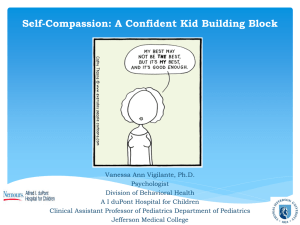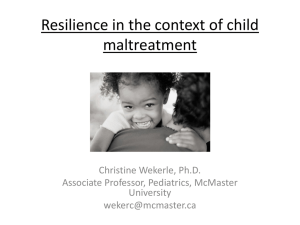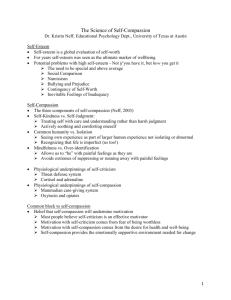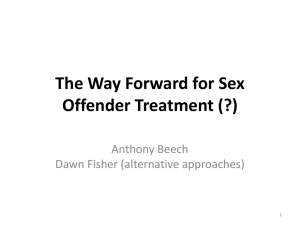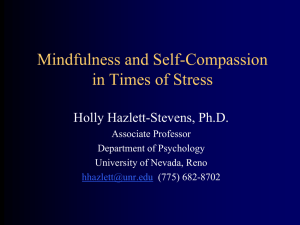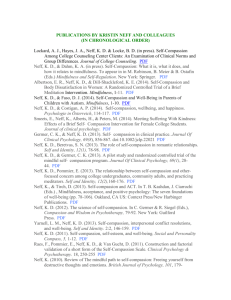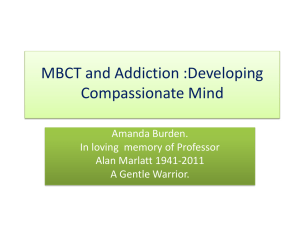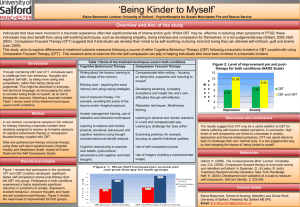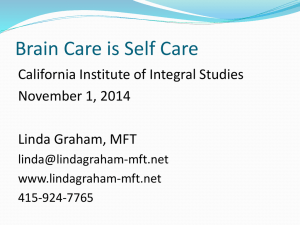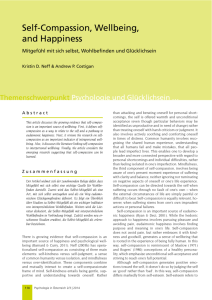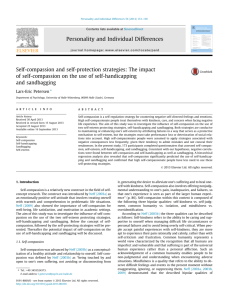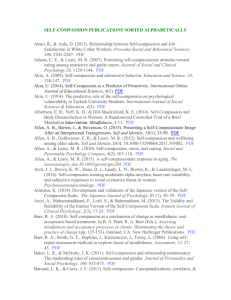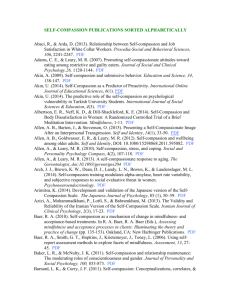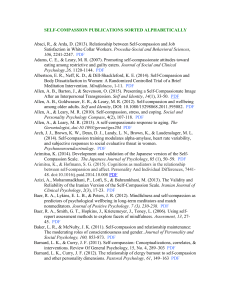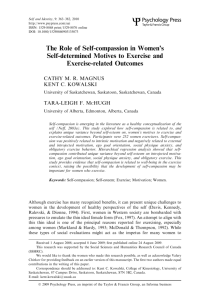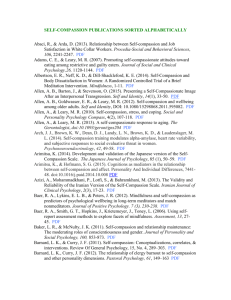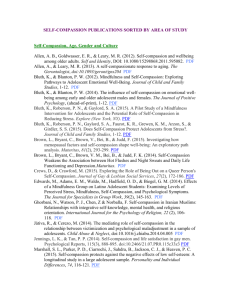Why and how we might focus on self
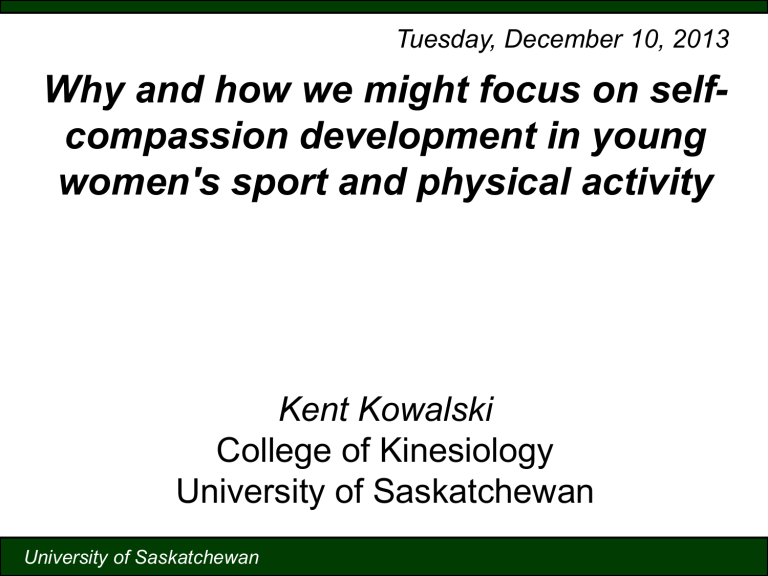
Tuesday, December 10, 2013
Why and how we might focus on selfcompassion development in young women's sport and physical activity
Kent Kowalski
College of Kinesiology
University of Saskatchewan
University of Saskatchewan
My primary research areas
• Measurement of Physical Activity
– PAQ-C, PAQ-A, PAQ-AD
• Coping and Emotion
• Physical Self-concept and Body Image
• Self-compassion in Sport, Health, and
Exercise (SHE) Psychology
University of Saskatchewan
Another challenge of self-esteem
“One of the basic problems with self-esteem is that it is based on evaluation of competence and self-worth --- how good am I, how much do I like myself? This is not a problem if one’s self-esteem is based on being a human who is intrinsically worthy of respect. However, at least in modern Western culture, self-esteem is often based on how the self is different from others, how much
one stands out or is special. It is not okay to be average, one must be above
average to feel good about oneself”.
Neff (2004)
University of Saskatchewan
Self-compassion
Kristin Neff
’
s Framework
“ Self-compassion, therefore, involves being touched by and open to one
’ s own suffering, not avoiding or disconnecting from it, generating the desire to alleviate one
’ s suffering and to heal oneself with kindness. Self-compassion also involves offering nonjudgmental understanding to one ’ s pain, inadequacies and failures, so that one ’ s experience is seen as part of the larger human experience .
”
Kristin Neff (2003)
Self-Kindness Common Humanity Mindfulness
Self-Judgment
University of Saskatchewan
Isolation Overidentification
Neff, 2003
Research on Self-Compassion
• There has been well over 100 publications in the area of self-compassion since 2003, with the vast majority published in the last 4-5 years
Some Examples of Research Areas
Romantic relationships e.g., Neff & Beretvas, 2012
Transition to college e.g., Terry et al., 2012
Smoking e.g., Kelly et al., 2010
Interpersonal conflict e.g., Yarnell & Neff, 2012
Alcohol use e.g., Brooks et al., 2012
Depression & anxiety e.g., MacBeth & Gumley, 2012
Submissive behaviour e.g., Akin, 2009
Restrained eating e.g., Adams & Leary, 2007
Clergy burnout e.g., Barnard & Curry, 2012
University of Saskatchewan
Anxiety
Some Correlates
Depression
Negative affect
Perfectionism Self-criticism Rumination
Fear of failure
Relationship satisfaction
& security
Personal initiative
University of Saskatchewan
Life satisfaction
Happiness
Social connectedness
Optimism
Curiosity
Neff, 2009, 2011; Raes, 2010
Some Correlates
Gender
Women tend to be less self-compassionate than men
Perhaps somewhat surprisingly, there is little evidence for age differences
University of Saskatchewan
Neff, 2009, 2011; Raes, 2010
Research on Self-Compassion
Summary of Main Findings*
• Self-compassion is positively related to positive aspects of health and negatively related to negative aspects of health
• Self-compassion explains variance beyond selfesteem
• Self-compassion interventions tend to be effective
*These same findings are emerging in sport and exercise psychology research as well!
University of Saskatchewan
Self-Compassion and the Self-
Conscious Emotions
The purpose of this research was to better understand young women athletes' experiences of self-conscious emotions (i.e., guilt, shame, pride), and the role of self-compassion in these emotional experiences
University of Saskatchewan
SSHRC* Program of Research
Self-compassion and women ’s motives to exercise
Self-compassion and self-conscious emotions
Self-compassion and psychological flourishing
*Social Sciences and Humanities Research Council of Canada
University of Saskatchewan
Research Summary
• Self-compassion is clearly relevant to the lives of young women athletes and exercisers
– And important beyond self-esteem
• There might be a self-compassion in different domains
– (e.g., “body self-compassion”)
• Self-compassion is an important predictor of athletes ’ thoughts, emotions, and reactions when faced with emotional challenges
• Prominent potential ways through which self-compassion impacts psychological flourishing seem to be increased positivity and perseverance and decreased passivity
• Some athletes are wary of being too self-compassionate
University of Saskatchewan
Self-compassion Interventions
• Self-compassionate writing
(Leary et al., 2007)
– Most effective for those low in self-compassion
• Compassionate imagery
(Gilbert & Irons, 2004)
– Used to counter self-criticism through increases in self-soothing and self-compassion
• Compassionate Mind Training
(Gilbert & Procter, 2006)
– Designed for those high in shame and self-criticism
• Uses a variety of skills, including imagery and writing
University of Saskatchewan
An example of Leary et al.
’ s (2007)
Self-Compassionate Writing
• Think about a negative event that you experienced that made you feel badly about yourself—something that involved failure, humiliation, or rejection.
– List ways in which other people also experience similar events
• (common humanity)
– Write a paragraph expressing understanding, kindness, and concern to yourself in the same way that you might express concern to a friend who had undergone the experience
• (self-kindness)
– Describe your feelings about the event in an objective and unemotional fashion
• (mindfulness)
University of Saskatchewan
Leary et al., 2007
Self-compassion Interventions
• Mindful Self-Compassion Program
(Neff & Germer, 2013)
– 8-week workshop
• Week 1: A general introduction to self-compassion
• Week 2: Foundational knowledge of mindfulness
• Week 3: Application of self-compassion in aspects of life
• Week 4: Participants develop a compassionate inner voice
• Week 5: Living in accordance with core values
• Week 6: Skills to deal with difficult emotions
• Week 7: Dealing with challenging interpersonal relationships
• Week 8: Relating to positive aspects of oneself and one ’ s life with appreciation
University of Saskatchewan
Self-compassion Interventions
• Self-compassion in Sport
(Mosewich et al., 2013)
– Five modules over a 7-day period
• Psychoeducation
– Overview of emotion, coping, and self-compassion
• Module 1: Writing about most significant set-back (past year)
• Modules 2-4: Common humanity, self-kindness, and mindfulness writing exercises
• Module 5: Application of all self-compassion skills to a recent negative event (past week)
University of Saskatchewan
But a Remaining Question…
What is the best way to intervene?
University of Saskatchewan
University of Saskatchewan
The Last Word
Kristin Neff
YouTube: “ 2-Minute Tips: How to Practice Self-
Compassion ” (2:01) http://www.youtube.com/watch?v=Qes9HoxfkE0
Thank-you
kent.kowalski@usask.ca
SHE Psychology Lab
University of Saskatchewan
